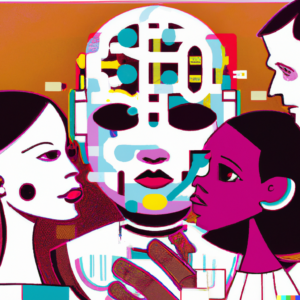This article was produced by feeding Claudia Alick’s tweet thread into Chat-GPT. The image above is from Dall-E.
The emergence and advancement of Artificial Intelligence (AI) has brought about significant changes in various fields, including entertainment, medicine, education, and more. However, as AI becomes increasingly integrated into our daily lives, it raises important ethical questions, such as bias and discrimination. Calling Up Justice is experimenting with the AI platforms such as Chat-GPT to surface issues and give feedback that reduces bias.
One example of this is highlighted in our last project where we asked an AI platform to list all the Black characters in Star Trek, but the AI included white characters and failed to list all the Black characters. The AI platform is “race blind,” which seems to have resulted in racial bias. This incident highlights the need to address the ethical considerations of AI.
The lack of diversity and inclusivity in AI is a growing concern that needs to be addressed. While AI is created and programmed by humans, it is not immune to the biases and prejudices that exist in society. As a result, AI can perpetuate and amplify these biases and contribute to the reproduction of Supremacy Culture ideologues.
It immediately told me that it would give me the notable ones. In theory it should have access to all of that data. It’s not a long list (alas) and I didn’t expect it to include the one line or no line characters I’d want to include. It kept including white people though..,.SUS! pic.twitter.com/9avF4QPWxE
— claudiaalick (@claudiaalick) March 3, 2023
A platform that acknowledges the presence of bias does not solve the issue of bias; it only promotes and reproduces it on a global scale. Therefore, it is crucial to consider the ethical implications of AI, specifically the impact it has on marginalized communities. The bias and discrimination embedded in AI can significantly impact the lives of marginalized individuals and communities, from limiting their opportunities to reinforcing harmful stereotypes.
To mitigate the negative impact of AI, there is a need to prioritize diversity and inclusivity in the development and deployment of AI systems. AI developers need to be aware of their own biases and work to create AI systems that are sensitive to the diverse needs of different communities. Additionally, there is a need for increased transparency and accountability in AI development, with ethical considerations at the forefront.
In conclusion, while AI has the potential to be an incredible accessibility aid, it is essential to consider the ethical implications of AI systems. The lack of diversity and inclusivity in AI can perpetuate and amplify biases and contribute to the reproduction of Supremacy Culture ideologues. Therefore, it is crucial to prioritize ethical considerations in AI development to ensure that it benefits all members of society equally.

